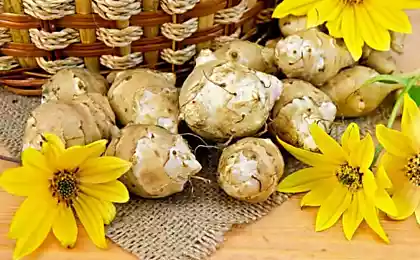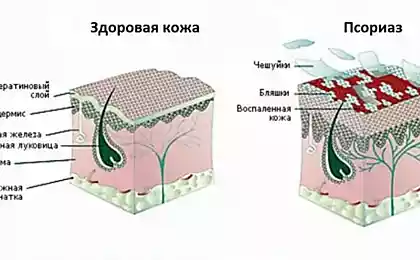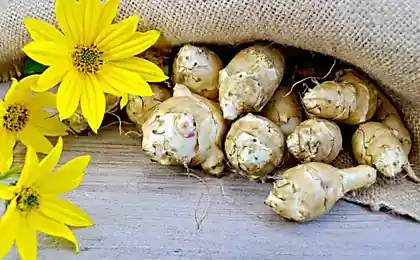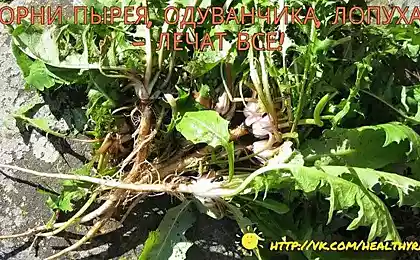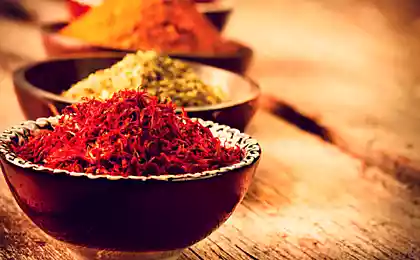848
The vegetable that cures gout, psoriasis, osteoarthritis and more!
The Jerusalem artichoke is not only delicious, but also incredibly useful root. The Jerusalem artichoke, is not called the eternal potatoes, because in one place it can grow for about 30 years and bring in the harvest several times more than potatoes. Can be used for medicinal purposes.
The use of plants Jerusalem artichoke:
the use of tubers
Artichoke the artichoke is a unique medicinal plant. It contains pectin, vitamins, enzymes and minerals. The chemical composition of the tubers is similar to potatoes. However, they have more iron.
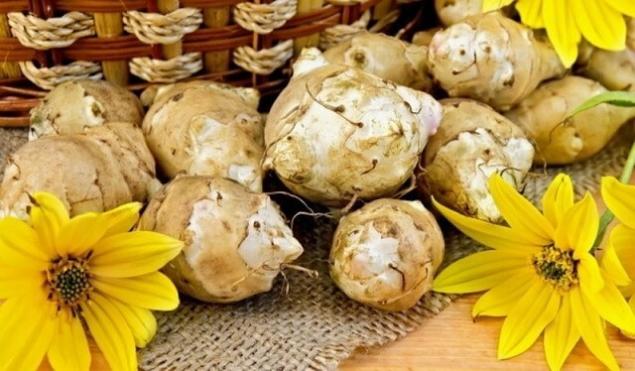
Eating artichoke helps with hypertension by reducing vascular tone. Increases hemoglobin. Lowers cholesterol in the blood, removes toxins, radioactive substances. Helps to get rid of stones in the bladder. Its fresh juice can reduce the acidity in the stomach. The leaves of the plant to treat burns, gout, psoriasis, osteochondrosis. It is useful to take a bath of artichoke. The tubers are rich in insulin, so you should include in your diet the tubers to those who are sick with diabetes.
One of the main healing properties of the artichoke is the content of inulin, which promotes absorption of glucose in the human body. So it is very useful for people who suffer from diabetes and diseases of the pancreas.
Artichoke for weight loss.
This is a great tool for weight loss. Inulin contained in Jerusalem artichoke, leads to normal metabolism, including adipose, struggling with excess weight. For weight loss choose salads. Do not mix the salads with other foods. Include in your diet is required.
Heartburn, headache at elevated pressure.
Take your morning Jerusalem artichoke Jerusalem artichoke juice (2 tbsp juice, diluted half with water).
Diabetes.
You can use the leaves of Jerusalem artichoke — wash, cut, pour vegetable oil and consume as salad. Or daily eat 4-5 fresh or boiled tuber.
Runny nose.
Bury his nose in the juice of Jerusalem artichoke tubers (10-12 drops 4 times a day).
The deposition of salts, radiculitis, osteochondrosis.
Baths with Jerusalem artichoke: cut 2 kg of leaves and stems (or 1 kg of raw tubers), put them in a pot, cover with water, bring to boil, simmer 30 min, drain the Broth and pour into the tub with a temperature of about 40°C. take a Bath for 15 min. the Course of treatment 10 baths.
The juice of Jerusalem artichoke.
Tubers wash, squeeze the juice. Peel clean off is not recommended. Drain. In the fridge keep no more than 12 hours.
Take freshly prepared 1/2 Cup before meals for 2 weeks. A great remedy for stomach, heartburn, headache. Relieves constipation and intestinal colic.
For food, you can also use the leaves of the artichokes, adding them to salads and green smoothies.
Jerusalem artichoke has many names: "artichoke", "Jerusalem artichoke", "sun root." Another name for the Jerusalem artichoke — a tuber of the sunflower, because these plants of the same genus. All of these names, the plant received centuries of use. Ancestors appreciated for its taste and medicinal properties, but we underestimate. Apparently the fact that too little is known.
The tubers of Jerusalem artichoke have a very intricate shape fusiform, pear-shaped, round, oval etc. Inflorescence Jerusalem artichoke is a sunflower seed in a miniature basket. The appearance is not devoid of decorative qualities.
Flowers of Jerusalem artichoke
Homeland plants – America, where it grows wild. In the sixteenth century, the artichoke was introduced into England, and later she went to France, where he received his traditional name "Jerusalem artichoke" (from the name of a tribe of Indians tupinamba). In Russia the sun's root was in the nineteenth century. Fell in love, and cookbooks began to be filled with many recipes from unusual tubers.
Healthy properties of Jerusalem artichoke
The mere fact that the Jerusalem artichoke is not susceptible to various pollutants and remains what is called an environmentally friendly product that already makes it extremely useful. But this property he is able to convey to us. Regular upotreblenyya promotes deep cleanse the body, ridding it of toxins, heavy metals and other nasty things that inevitably accumulated in the city. The Jerusalem artichoke contains pectin, which is a good absorbent and cause the same wonderful ability to clean the body. By the way, thanks to him also from Jerusalem artichoke can get the syrup and cook wonderful jam (by the way, diet, but more on that below). Here's toli toli root fruit!
Bringing the body of "toxins" the root adds to its other more useful and necessary substances mineral salts (potassium, silicon, zinc, iron), pectin, amino acids, proteins and lots of vitamins ( B1, B2, B6, C, PP). The polysaccharide content makes it a quite energy-intensive. Depending on the time of collecting the sugar content in the tubers may be different. The minimum rate of the substance noted in early October (eight percent), the maximum – in the beginning of December (twenty percent). Sugar accumulates in the tubers due to the outflow from the leaves and stems of nutrients.
There is evidence of the fact that regular consumption of this root vegetable for a long time, reduces the concentration of sugar in the blood. This is due to another wonderful element that is present in the Jerusalem artichoke — inulin. Inulin — a polysaccharide, a source of energy, but its peculiarity is that the processing of his body not associated with an increased release of glucose, as in the case of the carbohydrates contained, for example, other roots, so there is no risk of occurrence of diabetes. There is good news for diabetics. During storage of Jerusalem artichoke inulin is converted into fructose, and the root fits into their diet. Remember the delicious jam from Jerusalem artichoke? Eat it, drink compote of Jerusalem artichoke and all this without the typical consequences.
Studies followed by experiments have shown a significant positive effect of artichoke on the digestive system. With food and in the process of digestion, the intestine gets a huge amount of ballast compounds that bind to and neytralizuya. Parallel to the improved condition of the gastrointestinal tract, stimulates the choleretic activity.
The use of artichoke helps to strengthen the immune system, increase resistance to various viruses and infections that affects the digestive system. The nutrients of this vegetable do not allow penetration into the body of various parasites and bacteria, for example, opistorhisov. In addition, artichoke contributes to the formation of the normal intestinal flora, creating all the necessary conditions for this. This is why this product is indispensable for people suffering from dysbiosis. Artichoke improves blood flow to mucous membranes, it is used in the treatment of stomach ulcers, duodenitis, enteritis, gastritis, pancreatitis, to eliminate heartburn, constipation and diarrhea.
Also, this fruit can be used to stop vomiting, relieve nausea, to get rid of bitter taste in the mouth, eliminate bloating and pain. When co-administered Jerusalem artichoke and various medications, the treatment period is shortened by five to seven days.
Root also promotes the absorption of selenium, despite the fact that it includes no present, this trace element.
There is a benefit and in the ground part of Jerusalem artichoke. It is generally used for feeding cattle, but from the stalks by pressing it is possible to obtain the sweet juice, suitable for making molasses. For feed varieties of plants characterized by a small number of tubers and the presence of dense green mass. If you feed cows a Jerusalem artichoke, they significantly added the milk yield and fat content of milk this increases. When feeding the vegetable hens, increased egg production, the period of beginning of egg laying is reduced by two to three weeks. Also Jerusalem artichoke feed goats, pigs, sheep and rabbits. Especially this valuable early spring forage because it contains significant amounts of vitamins and nutrients.
Growing
Artichoke is mainly propagated by means of tubers. In the middle zone of Russia, and also in the North, its seeds do not ripen. In one place this plant can grow more than forty years! In autumn, the ground part of Jerusalem artichoke dies, the remaining spring germinate in the soil the tubers, and the plant again repeats its cycle of development and growth. Its roots deep into the soil, which contributes to high drought resistance. Tubers usually are substituted close to the surface, their weight rarely exceeds one hundred twenty grams.
Grown artichoke as well as potatoes. Since the advent of the green shoots it, Spud ground that the beneficial effect on the crop. You can plant Jerusalem artichokes in winter or early spring. In the winter, it is necessary to put only whole tubers, cut can bend. The spring planting is allowed cutting of tubers, it is important not to damage the eyes kidney growth. The plant prefers a Sunny position.
Jerusalem artichoke has an interesting feature: it can be harvested in autumn and spring. The tubers are not dug up, perfectly preserved under the snow. They can survive the thaw, and freeze again when you chill, and their vitality and nutritional value does not suffer. More!
If you need to plant other crops on the place where he grew Jerusalem artichokes, thoroughly collect all remaining in the land of the tubers.
How to store Jerusalem artichokes?
In the basement earthen pear should be stored at a temperature of zero degrees Celsius. Root crops are perishable and dry in an ordinary home, making them unfit for consumption.
Preferably the spring digging tubers than the autumn. As soon as the snow melts and the ground thaws, we can start to choose earthy pear. At a time when fruits and vegetables have almost no vitamins in it, they are saved in full. published
P. S. And remember, only by changing their consumption — together we change the world! ©
Source: pervorod.ru/product/topinambur-semena
The use of plants Jerusalem artichoke:
the use of tubers
Artichoke the artichoke is a unique medicinal plant. It contains pectin, vitamins, enzymes and minerals. The chemical composition of the tubers is similar to potatoes. However, they have more iron.

Eating artichoke helps with hypertension by reducing vascular tone. Increases hemoglobin. Lowers cholesterol in the blood, removes toxins, radioactive substances. Helps to get rid of stones in the bladder. Its fresh juice can reduce the acidity in the stomach. The leaves of the plant to treat burns, gout, psoriasis, osteochondrosis. It is useful to take a bath of artichoke. The tubers are rich in insulin, so you should include in your diet the tubers to those who are sick with diabetes.
One of the main healing properties of the artichoke is the content of inulin, which promotes absorption of glucose in the human body. So it is very useful for people who suffer from diabetes and diseases of the pancreas.
Artichoke for weight loss.
This is a great tool for weight loss. Inulin contained in Jerusalem artichoke, leads to normal metabolism, including adipose, struggling with excess weight. For weight loss choose salads. Do not mix the salads with other foods. Include in your diet is required.
Heartburn, headache at elevated pressure.
Take your morning Jerusalem artichoke Jerusalem artichoke juice (2 tbsp juice, diluted half with water).
Diabetes.
You can use the leaves of Jerusalem artichoke — wash, cut, pour vegetable oil and consume as salad. Or daily eat 4-5 fresh or boiled tuber.
Runny nose.
Bury his nose in the juice of Jerusalem artichoke tubers (10-12 drops 4 times a day).
The deposition of salts, radiculitis, osteochondrosis.
Baths with Jerusalem artichoke: cut 2 kg of leaves and stems (or 1 kg of raw tubers), put them in a pot, cover with water, bring to boil, simmer 30 min, drain the Broth and pour into the tub with a temperature of about 40°C. take a Bath for 15 min. the Course of treatment 10 baths.
The juice of Jerusalem artichoke.
Tubers wash, squeeze the juice. Peel clean off is not recommended. Drain. In the fridge keep no more than 12 hours.
Take freshly prepared 1/2 Cup before meals for 2 weeks. A great remedy for stomach, heartburn, headache. Relieves constipation and intestinal colic.
For food, you can also use the leaves of the artichokes, adding them to salads and green smoothies.
Jerusalem artichoke has many names: "artichoke", "Jerusalem artichoke", "sun root." Another name for the Jerusalem artichoke — a tuber of the sunflower, because these plants of the same genus. All of these names, the plant received centuries of use. Ancestors appreciated for its taste and medicinal properties, but we underestimate. Apparently the fact that too little is known.
The tubers of Jerusalem artichoke have a very intricate shape fusiform, pear-shaped, round, oval etc. Inflorescence Jerusalem artichoke is a sunflower seed in a miniature basket. The appearance is not devoid of decorative qualities.
Flowers of Jerusalem artichoke
Homeland plants – America, where it grows wild. In the sixteenth century, the artichoke was introduced into England, and later she went to France, where he received his traditional name "Jerusalem artichoke" (from the name of a tribe of Indians tupinamba). In Russia the sun's root was in the nineteenth century. Fell in love, and cookbooks began to be filled with many recipes from unusual tubers.
Healthy properties of Jerusalem artichoke
The mere fact that the Jerusalem artichoke is not susceptible to various pollutants and remains what is called an environmentally friendly product that already makes it extremely useful. But this property he is able to convey to us. Regular upotreblenyya promotes deep cleanse the body, ridding it of toxins, heavy metals and other nasty things that inevitably accumulated in the city. The Jerusalem artichoke contains pectin, which is a good absorbent and cause the same wonderful ability to clean the body. By the way, thanks to him also from Jerusalem artichoke can get the syrup and cook wonderful jam (by the way, diet, but more on that below). Here's toli toli root fruit!
Bringing the body of "toxins" the root adds to its other more useful and necessary substances mineral salts (potassium, silicon, zinc, iron), pectin, amino acids, proteins and lots of vitamins ( B1, B2, B6, C, PP). The polysaccharide content makes it a quite energy-intensive. Depending on the time of collecting the sugar content in the tubers may be different. The minimum rate of the substance noted in early October (eight percent), the maximum – in the beginning of December (twenty percent). Sugar accumulates in the tubers due to the outflow from the leaves and stems of nutrients.
There is evidence of the fact that regular consumption of this root vegetable for a long time, reduces the concentration of sugar in the blood. This is due to another wonderful element that is present in the Jerusalem artichoke — inulin. Inulin — a polysaccharide, a source of energy, but its peculiarity is that the processing of his body not associated with an increased release of glucose, as in the case of the carbohydrates contained, for example, other roots, so there is no risk of occurrence of diabetes. There is good news for diabetics. During storage of Jerusalem artichoke inulin is converted into fructose, and the root fits into their diet. Remember the delicious jam from Jerusalem artichoke? Eat it, drink compote of Jerusalem artichoke and all this without the typical consequences.
Studies followed by experiments have shown a significant positive effect of artichoke on the digestive system. With food and in the process of digestion, the intestine gets a huge amount of ballast compounds that bind to and neytralizuya. Parallel to the improved condition of the gastrointestinal tract, stimulates the choleretic activity.
The use of artichoke helps to strengthen the immune system, increase resistance to various viruses and infections that affects the digestive system. The nutrients of this vegetable do not allow penetration into the body of various parasites and bacteria, for example, opistorhisov. In addition, artichoke contributes to the formation of the normal intestinal flora, creating all the necessary conditions for this. This is why this product is indispensable for people suffering from dysbiosis. Artichoke improves blood flow to mucous membranes, it is used in the treatment of stomach ulcers, duodenitis, enteritis, gastritis, pancreatitis, to eliminate heartburn, constipation and diarrhea.
Also, this fruit can be used to stop vomiting, relieve nausea, to get rid of bitter taste in the mouth, eliminate bloating and pain. When co-administered Jerusalem artichoke and various medications, the treatment period is shortened by five to seven days.
Root also promotes the absorption of selenium, despite the fact that it includes no present, this trace element.
There is a benefit and in the ground part of Jerusalem artichoke. It is generally used for feeding cattle, but from the stalks by pressing it is possible to obtain the sweet juice, suitable for making molasses. For feed varieties of plants characterized by a small number of tubers and the presence of dense green mass. If you feed cows a Jerusalem artichoke, they significantly added the milk yield and fat content of milk this increases. When feeding the vegetable hens, increased egg production, the period of beginning of egg laying is reduced by two to three weeks. Also Jerusalem artichoke feed goats, pigs, sheep and rabbits. Especially this valuable early spring forage because it contains significant amounts of vitamins and nutrients.
Growing
Artichoke is mainly propagated by means of tubers. In the middle zone of Russia, and also in the North, its seeds do not ripen. In one place this plant can grow more than forty years! In autumn, the ground part of Jerusalem artichoke dies, the remaining spring germinate in the soil the tubers, and the plant again repeats its cycle of development and growth. Its roots deep into the soil, which contributes to high drought resistance. Tubers usually are substituted close to the surface, their weight rarely exceeds one hundred twenty grams.
Grown artichoke as well as potatoes. Since the advent of the green shoots it, Spud ground that the beneficial effect on the crop. You can plant Jerusalem artichokes in winter or early spring. In the winter, it is necessary to put only whole tubers, cut can bend. The spring planting is allowed cutting of tubers, it is important not to damage the eyes kidney growth. The plant prefers a Sunny position.
Jerusalem artichoke has an interesting feature: it can be harvested in autumn and spring. The tubers are not dug up, perfectly preserved under the snow. They can survive the thaw, and freeze again when you chill, and their vitality and nutritional value does not suffer. More!
If you need to plant other crops on the place where he grew Jerusalem artichokes, thoroughly collect all remaining in the land of the tubers.
How to store Jerusalem artichokes?
In the basement earthen pear should be stored at a temperature of zero degrees Celsius. Root crops are perishable and dry in an ordinary home, making them unfit for consumption.
Preferably the spring digging tubers than the autumn. As soon as the snow melts and the ground thaws, we can start to choose earthy pear. At a time when fruits and vegetables have almost no vitamins in it, they are saved in full. published
P. S. And remember, only by changing their consumption — together we change the world! ©
Source: pervorod.ru/product/topinambur-semena






